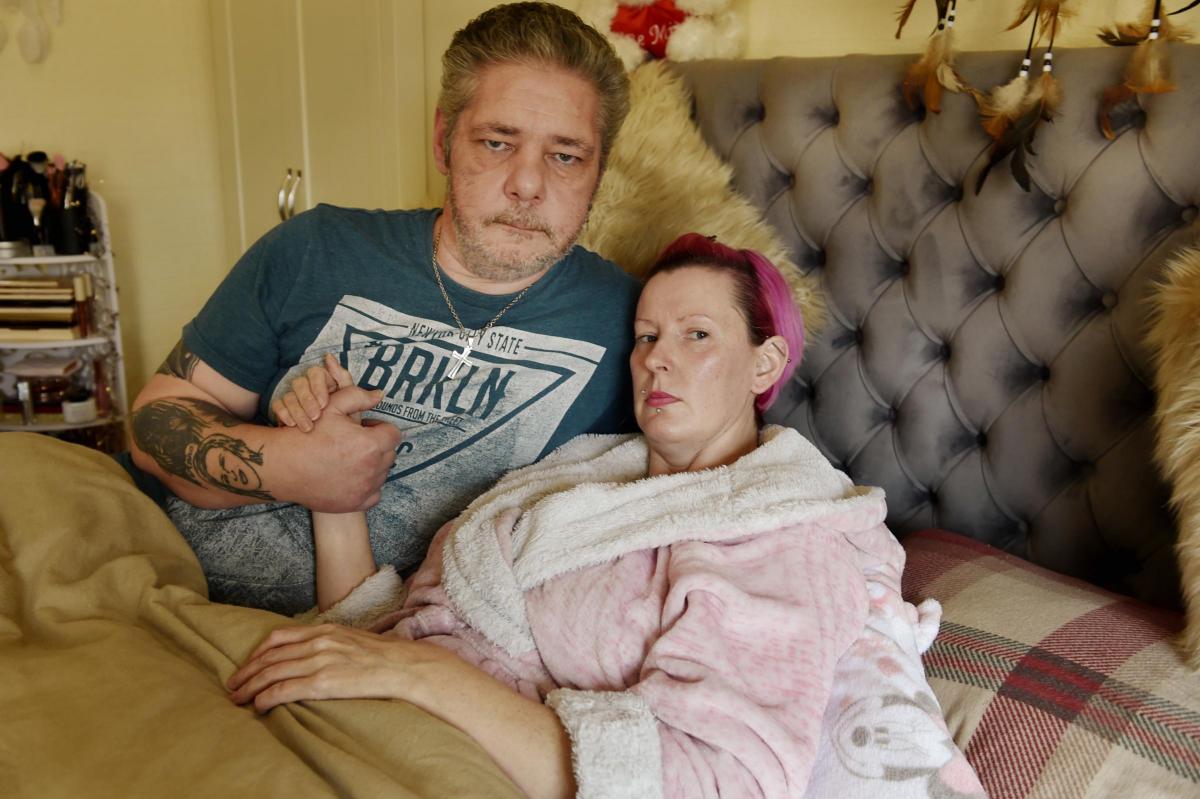Carlisle Woman Denied PIP Despite Being Paralysed
Thursday 28 February, 2019 Written by Tom Coleman
A partially paralysed Carlisle woman on daily doses of morphine has been denied disability benefits.
Anna Yellop, 48 was devastated to learn she had failed to qualify for Personal Independence Payment (PIP), leaving her in a state of financial crisis.
White matter lesions – scarring – on her brain tissue sustained after contracting swine flu in 2011 has left her almost completely unable to stand, walk or fully concentrate.
Often in great pain, Anna, who lives in Raffles, takes up to 200mg of morphine each day.
Anna is cared for full-time by her husband Andy, 47. As a result of Anna’s rejected PIP application, he has been told he is set to have his Carer’s Allowance stopped, pushing the couple further into financial emergency.
Previously in receipt of the highest rate of Disability Living Allowance (DLA), Anna’s application for PIP was triggered automatically as part of a government phase-out of the benefit.
But her unsuccessful PIP application means that as of last Tuesday, Anna’s disability benefits have been cut off.
Being eligible for PIP is not means-tested, meaning applicants can qualify for the benefit regardless of income.
Applicants are assessed entirely on the extent to which their disability affects their daily life.

Image: Anna Yellop and husband Andy.
However, Anna's health issues have prevented her from working for years. Andy also suffers health problems, leaving him unable to work.
This has left them in a precarious financial situation, now made worse by the recent decision.
Anna stressed that finding work to solve her financial situation is not an option.
“I’m not fit to work in any way” Anna said. “I can’t stand for more than two seconds, I can’t walk in any way, shape or form. I can’t even sit up properly, or I feel sick.”
Under the impression she was simply to be shifted from DLA to PIP, Anna was distraught at the news her PIP application had failed.
“When I read the letter, I burst into tears straight away. I felt completely as if my head had been bashed in.
“I felt as if someone had just come and totally robbed me of everything – it isn’t just your money, it’s your life.
“It’s your life. It’s everything I’ve gone and lost.”
“The assessor came into my home and robbed me of my life.”
Anna said that without the love and support of her husband, Andy, the experience would have driven her to suicide.
“I would just take every tablet and end it, and let the government have the money.
“Let them save their precious money and I’ll be in a coffin for them.”
Andy explained that much of their furniture is on hire purchase.
“If we don’t get this money back, I can’t pay for it,” Andy said.
“They’re just going to come and take all our furniture on top of everything else.
“It isn’t just the money. My pride has gone now.”
Anna agreed. “So has mine”, she said.
“I didn’t choose to be like this.
“I feel like I let everybody down because I can’t work.
“But sometimes I’ve got to be strong and say to myself ‘you can’t help it, you didn’t choose to be ill.’”
Anna suffers frequent neurological attacks that require Andy to rush her to accident and emergency, using their specially adapted car.
However the car will have to be returned if Anna cannot regain her disability benefits.
Andy predicts that once his Carer’s Allowance also stops – which he has been told it soon will – the couple will be left with about £50 per week to live on.
The couple’s next step is to fight to regain the money they’ve lost.
They have enlisted the help of the Benefits Advice Service at Carlisle City Council, having secured an appointment this week.
And they are hoping to have the PIP application decision reviewed soon as part of the Mandatory Reconsideration process.
Should this be unsuccessful, they would have to take the decision to a tribunal, which could take months.
When asked about Mrs Yellop’s case, a DWP spokesman said: “We’re committed to ensuring that disabled people get the full support that they need.
“Decisions are made following consideration of all the information provided by the claimant, including supporting evidence from their GP or medical specialist.
“Anyone who is unhappy with a decision can ask for it to be reconsidered straight away.
“We are currently re-examining Ms Yellop’s case and will be in contact with her shortly.”
The PIP benefit explained
Personal Independence Payment (PIP), first introduced in 2013, is a benefit designed to help people with long-term health issues or disabilities meet their costs of living.
Carlisle has seen a rise in people claiming PIP, from 3,599 in October 2017 to 4,385 in October 2018, the most recent month on record.
A likely contributor to this rise is the gradual phasing out of DLA in favour of PIP being conducted by the Department for Work and Pensions, the government body responsible for benefits.
About 500 residents each year struggling to navigate the complexities of the benefits system turn to Carlisle City Council’s benefits advice service.
The service helps a range of people, some in desperate states of crisis.
Team member Karen Osborne told the News & Star that in the most extreme cases, the service has dealt with people on the brink of starvation.
“I’ve had people who have had no money for three or four months. They’ve hardly eaten for weeks on end, and were starving,” Karen said.
PIP can be claimed whether the applicant is working or not - the criteria is based on an applicant’s health rather than their income.
It is therefore different to another often-talked about new benefit - Universal Credit - which is only available to those on a low income, or those not in work.
Designed to help those whose disabilities meet the extra costs their situation requires, the assessment is based on a points system, with greater difficulty completing daily tasks such as getting dressed earning the applicant more points.
These points are awarded at a face-to-face assessment, where the applicant is also asked a series of questions about how their disability affects their daily life.
This assessment, coupled with documented medical evidence submitted by the applicant, informs the DWP’s decision whether or not to award PIP.
The decision can be contested if the application is rejected. According to the Citizen’s Advice Bureau, “the latest government statistics show that more than half of PIP decisions are changed after mandatory reconsideration or an appeal to a tribunal.”
ABC Comment, have your say below:

1 comment
-
Comment Link
 Thursday 28 February, 2019
posted by
Simon Collyer
Thursday 28 February, 2019
posted by
Simon Collyer
Leave a comment
Make sure you enter all the required information, indicated by an asterisk (*). HTML code is not allowed.
Join
FREE
Here










